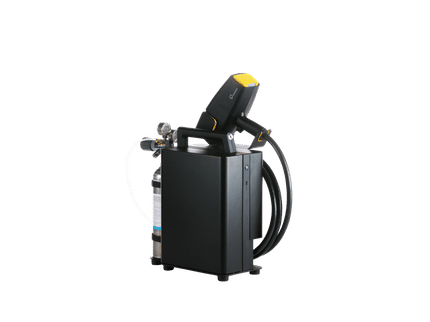To use all functions of this page, please activate cookies in your browser.
my.chemeurope.com
With an accout for my.chemeurope.com you can always see everything at a glance – and you can configure your own website and individual newsletter.
- My watch list
- My saved searches
- My saved topics
- My newsletter
Flow batteryA flow battery is a form of rechargable battery in which electrolyte containing one or more dissolved electroactive species flows through a power cell / reactor in which chemical energy is converted to electricity. Additional electrolyte is stored externally, generally in tanks, and is usually pumped through the cell (or cells) of the reactor, although gravity feed systems are also known.. Flow batteries can be rapidly "recharged" by replacing the electrolyte liquid (in a similar way to refilling fuel tanks for internal combustion engines) while simultaneously recovering the spent material for re-energization. Fuel cells are generally defined as electrochemical devices for converting chemical energy to electricity in which the reactants are flowed through a power cell/ reactor from an external source (tank, cylinder or surrounding environment). Under these definitions it may be concluded that the flow battery is a special type of fuel cell. However, what is rarely explicitly stated is that the electrolyte in a fuel cell remains at all times within the reactor (in the form of an ion-exchange membrane, for example). What flows into the reactor are only the electroactive chemicals, which are non-conducting (e.g. hydrogen, methanol, oxygen, etc.) This is in stark contrast to a flow battery in which at least some of the electrolyte (generally the majority in weight and volume terms) flows through the reactor. Flow batteries are also distinguished from fuel cells by the fact that the chemical reaction involved is often reversible, i.e. they are generally of the secondary battery type and so they can be recharged without replacing the electroactive material. To add to the confusion the European Patent Organisation classes redox flow cells (H01M8/18C4) as a sub-class of regenerative fuel cells (H01M8/18). Product highlight
Classes of flow batteriesVarious classes of flow batteries exist including the redox (reduction-oxidation) flow battery, in which all electroactive components are dissolved in the electrolyte. If one or more electroactive component is deposited as a solid layer the system is known as a hybrid flow battery. The main difference between these two types of flow battery is that the energy of the redox flow battery can be determined fully independently of the battery power, because the energy is related to the electrolyte volume (tank size) and the power to the reactor size. The hybrid flow battery, similarly to a conventional battery, is limited in energy to the amount of solid material that can be accommodated within the reactor. In practical terms this means that the discharge time of a redox flow battery at full power can be varied, as required, from several minutes to many days, whereas a hybrid flow battery may be typically varied from several minutes to a few hours. Another type of flow battery is the redox fuel cell. This has a conventional flow battery reactor, which only operates to produce electricity (i.e. it is not electrically recharged). Recharge occurs by reduction of the negative electrolyte using a fuel (e.g. hydrogen) and oxidation of the positive electrolyte using an oxidant (typically oxygen or air). Examples of redox flow batteries are the vanadium redox flow battery, polysulfide bromide battery (Regenesys), and uranium redox flow battery. Hybrid flow batteries include the zinc-bromine, cerium-zinc and all-lead flow batteries. Redox fuel cells are less common commercially although many systems have been proposed. Advantages and disadvantagesRedox flow batteries, and to a lesser extent hybrid flow batteries, have the advantages of flexible layout (due to separation of the power and energy components), long cycle life (because there are no solid-solid phase changes), quick response times (in common with nearly all batteries), no need for "equalisation" charging and no harmful emissions (in common with nearly all batteries). Some types also offer easy state-of-charge determination (through voltage dependence on charge), low maintenance and tolerance to overcharge/ overdischarge. On the negative side, flow batteries are rather complicated in comparison with standard batteries as they may require pumps, sensors, control units and secondary containment vessels. The energy densities vary considerably but are, in general, rather low compared to portable batteries, such as the Li-ion. ApplicationsTaking the above considerations together it should be apparent that flow batteries are normally considered for relatively large (1 kW - many MW) stationary applications. These are for load levelling, where the battery is used to store cheap night-time electricity and provide electricity when it is more costly, as well as storing energy from renewable sources such as wind or solar for discharge during periods of peak demand; peak shaving, where spikes of demand are met by the battery; and UPS, where the battery is used if the main power fails to provide an uninterrupted supply. Because flow batteries can be rapidly "recharged" by replacing the electrolyte, they have been proposed for electric vehicles, and the use of vanadium redox flow batteries for load levelling in wind farm applications is already showing promise. A further potential application for redox flow batteries lies in the fact that all cells share the same electrolyte/s. Therefore, the electrolyte/s may be charged using a given number of cells and discharged with a different number. Because the voltage of the battery is proportional to the number of cells used the battery can therefore act as a very powerful dc-dc converter. In addition, if the number of cells is continuously changed (on the input and/ or output side) power conversion can also be ac-dc, ac-ac or dc-ac, with the frequency limited by that of the switching gear. See also
References
|
||||||
| This article is licensed under the GNU Free Documentation License. It uses material from the Wikipedia article "Flow_battery". A list of authors is available in Wikipedia. |







